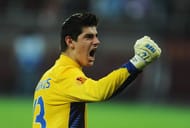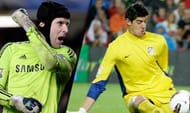The position of the goalkeeper has always been a tricky one for managers whenever competition for that spot arises. Outfield players, when in plenty, can be rotated. Hence, there may not arise a situation where one can envisage a direct competition for one spot in the team. As for the goalkeeper, it is a completely different ball game. In most squads, either the oldest and/or the most experienced goalkeeper assumes the role of number one, while his deputy is usually an average youngster or a waning veteran. So when a goalie’s time is up (either through the expiration of his contract or a transfer), teams find it difficult to replace them.
Manchester United‘s travails after the departure of Peter Schmeichel have been well documented. Fabian Barthez, Tim Howard, Roy Carroll, and Massimo Taibi were all tasked to replicate the legendary Dane, but all such trials ended up as bad experiments; some like Taibi were memorable for the opposition. The lack of a ready-made replacement for Schmeichel made such a mockery of the Manchester United goal that even an experienced manager like Sir Alex had to hunt for 6 long years to find a successor in the form of an ageing Edwin van der Sar. A young Tomasz Kuszczak and Ben Foster were being readied as replacements, but the gulf in class between them and the Dutchman was vastly evident. Gradually, they were all shipped out and David de Gea and Anders Lindegaard were bought in to fill the void left by van der Sar’s retirement. In Manchester United’s case, we can thus conclude that over the past decade, there has been a gulf in class between the number one and his understudy. They had to purchase players immediately to plug the gap when the established number one retired or left, with the subsequent replacements usually not up to the same standard as their predecessors. Now, David de Gea looks ready for the long term and Lindegaard, aiming to be a regular starter, may not be patient enough to hang around for much longer.
In Arsenal‘s case, David Seaman was replaced by Alex Manninger, followed by Jens Lehmann. Then, a bizarre pattern of events played out. Lehmann was replaced by Manuel Almunia on the pitch and Lukasz Fabianski on the bench, and subsequently left. Almunia was then replaced by Fabianski, and Wojciech Szczesny occupied the bench. Szczesny later replaced Fabianski in the starting XI. Thus in Arsenal’s case in recent years, the number 1 goalie suddenly plummeted to third choice, with the other two goalies pushed up accordingly; a clear indication of lack of conviction in decision-making and faith in the goalie.
Liverpool, meanwhile, have relied on Pepe Reina for far too long, and talks have emerged of him being sold without a clear indication of his replacement (possibly Victor Valdes). Reina has been backed up by Charles Itandje, Brad Jones and Alexander Doni, among others, in his reign as number one, with neither managing to push him too much.
As for Chelsea, Petr Cech has been the undisputed number one goalie for the past decade, establishing himself as a club legend. Carlo Cudicini (whom Cech replaced), Henrique Hilario, Ross Turnbull and Rhys Taylor have all been on the books, but appearances for either of those have been far and few in between. At present, Ross Turnbull and Henrique Hilario are Cech’s backups, but in a faraway land, a ready-made replacement for the Czech is waiting in the wings. Fulham find themselves in a similar situation too, with Mark Schwarzer clinging on to his spot owing to competition from David Stockdale (on loan currently). Spurs faced a similarly tricky situation at the beginning of the season as well – Hugo Lloris was bought for the long term, but Brad Friedel had done nothing wrong to get dropped instantly. Each of AVB’s two goalies are capable of being the undisputed number ones in separate clubs, but he has rotated them brilliantly, keeping both satisfied.
Coming back to Chelsea, it is a similar situation. Thibaut Courtois was signed as a long term replacement for Petr Cech. But there is a slight difference compared to Spurs and Fulham. Schwarzer and Friedel, nearing 40, might have, at the most, a couple of seasons left in them, so it makes sense in readying a successor now (Stockdale and Lloris respectively). The veteran can gradually be phased out of the first team to be replaced by the younger player. In fact, Spurs have started the process already (Brad Friedel has seen very little league action this season). But Petr Cech is around 8 years younger compared to either of them, so a ready replacement like Courtois is caught in a tricky situation. It is believed that a goalkeeper, unlike outfield players, reaches his peak in the few years after the age of 30. According to that consensus, Cech is now reaching his peak. At the top level, if he can carry on without injuries, he has at least 7 more seasons left in him. This begs the question why Chelsea actually thought of buying a replacement so soon, with Cech still at the top of his game. Three reasons can be thought of. Firstly, the obvious one – damage limitation. Get the prey before an enemy pounces on it. Secondly, Chelsea’s policy of offering only one-year deals (or in Frank Lampard’s case, sadly, no deal) to players aged above thirty might suggest that the boardroom is planning to say goodbye to Petr Cech once his current contract is up and then throw Courtois into the deep end. Or, another reason could be the increasing rate at which Cech is getting injured and the glaring ineptitude of Ross Turnbull to fill in when required.
Chelsea should not let Cech depart once his contract his up (in the summer of 2015). A legend like him does not deserve to be forced out according to the boardroom’s whims and fancies, which sadly happened to Didier Drogba, and will happen to Frank Lampard. He could offer valuable guidance to Courtois. But it is extremely unlikely that he will be offered a new deal once his current one is up – we have seen enough proof already of the board hardly caring for fans’ sentiments. So when Cech departs, possibly in two years’ time, Courtois will establish himself for the long term without anyone doubting his ability (like what de Gea faced). Ross Turnbull and/or Hilario (who has somehow managed to stay at the club even at the age of 37) may still hang around till then as reserves.
Another scenario one can think of is something similar to what Spurs are currently doing – rotating their keepers. Cech can rotate with Courtois in the final season of his contract (assuming that he is not offered a new contract), and if Courtois looks good enough to replace him, they can go ahead. With such an arrangement, both get a chance to learn from each other and improve, and contribute to a healthy working experience. It would be a good learning curve for both players. Suppose Courtois is deemed not ready yet, Cech’s contract may be extended by another year, and another season of the same rotating arrangement may follow.
In reality though, what has actually happened is that Chelsea have pounced on the prey before their rivals could spot it. Full credit for their vision for getting him ahead of the likes of Barcelona, PSG, Manchester City and the usual names thrown around. Signed from KRC Genk in 2011, Courtois is now in his second consecutive season on loan at Atletico Madrid, and is reportedly being tempted by Barcelona and other European heavyweights to ditch the instability at Chelsea and join them instead. Hopefully, Chelsea have a long term plan for integrating him into the first team and convincing him to put off all bidders. They should be seriously concerned that he occasionally comments on his loyalty to Atletico, and the doubtful nature of his long term plan with Chelsea. Please look into it, dear owner! Most probably, another loan deal to Atletico is on the cards this summer.

On loan at Athletico Madrid, he has justified Chelsea’s faith in buying him and looks ready to replace Cech
But another loan deal would mean continuing paying a part of his wages, and, indirectly, affecting the club’s plans to deal with FFP. With the knowledge that he is one of the most sought after goalkeepers in the world now, he will call the shots in the near future and demand for a bigger contract. This would mean Chelsea paying him more wages, with no on-the-pitch gains. The wage bill might then become a serious issue (Eden Hazard is already on a fat contract, and one can assume the wage bill to get thicker still, with the possible arrival of Falcao or Cavani or both). The ideal solution would be to improve his contract before he demands it and kick-starts a media frenzy, extends his stay at Atletico for a couple of seasons and persuades them to bear the excess while he is with them, and then recall him. The improved contract would mellow him down and make him agree to warming the bench occasionally and rotating with Cech for a season, and finally replacing him.
So how can Chelsea solve their puzzle?
“Why fix something that ain’t broke?” – this wise thought could be the answer to Chelsea’s unique situation involving Thibaut Courtois. Let things stay as they are, increase his wages, extend his loan deal to Atletico for two more seasons, and put all rumours to rest, would be the way to go. Two seasons later, having already gained four years of experience in La Liga, Thibaut Courtois will do to Petr Cech what Hugo Lloris is currently doing to Brad Friedel. He will rotate with Cech for a season, and then replace him. Chelsea will say goodbye to their legendary goalkeeper, and readily welcome a successor – a luxury that most clubs have not had.


